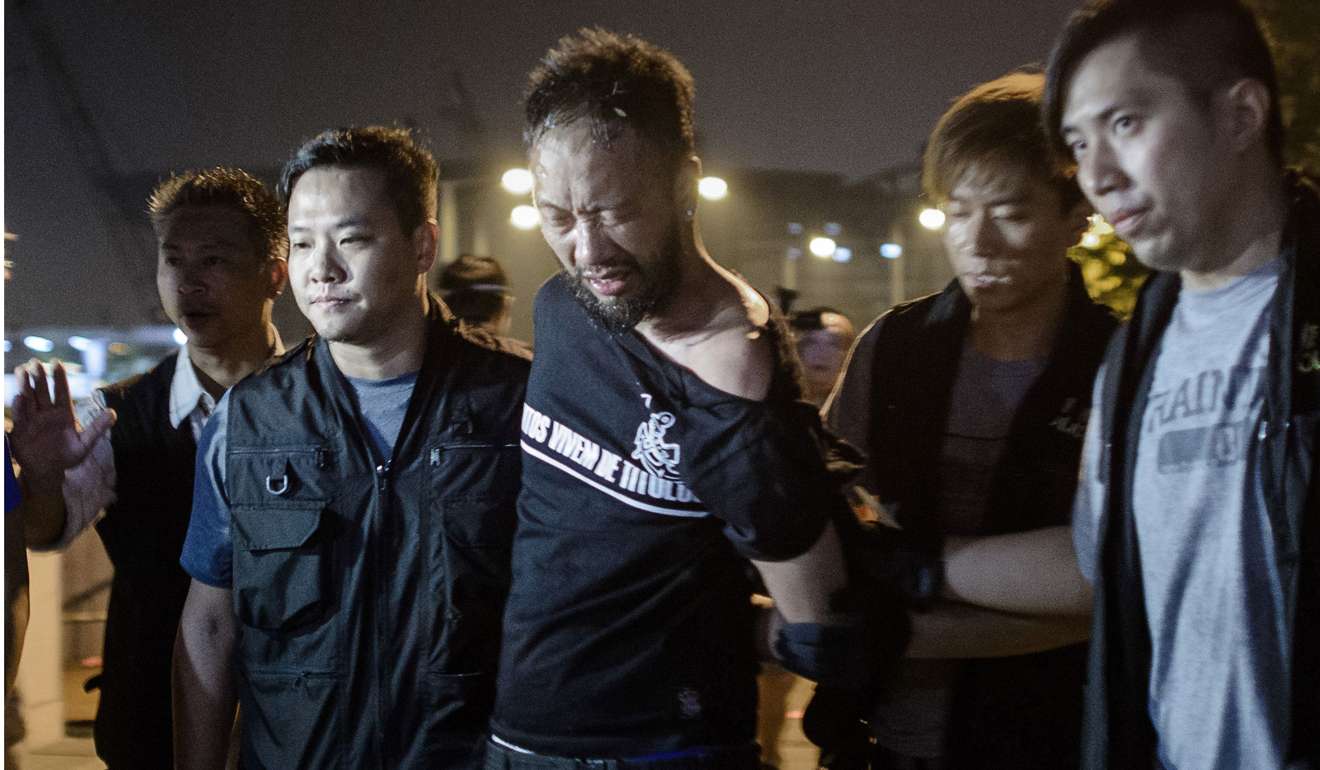
Hong Kong’s firm grip on the law in Occupy police assault case is a valuable lesson for the mainland
Audrey Jiajia Li says the conviction and sentencing of the seven officers who beat up Occupy protester Ken Tsang – and the open debate afterwards – is notable amid Chinese worry about police brutality

On October 15, 2014, the 17th day of the Occupy Central civil disobedience movement, a protester, Ken Tsang Kin-chiu, was arrested along with a few others; he then got knocked to the ground, punched, kicked and struck with a baton by police officers. The officers were later charged, and recently convicted and sentenced to two years in prison.
Watch: More than 30,000 gather in support of Hong Kong officers jailed for beating up Occupy protester
All this sounds like a satire: the seven policemen were convicted for using inappropriate violence, and their supporters are now calling for violence against the judge as revenge. As in a world where the law of the jungle rules, fists talk.
Independent judicial process deserves the utmost respect

Stirring nationalist fervour over jailing of police officers will only hurt Hong Kong
Noticeably, behind the online assault, there is rising ultra-nationalism. Over the past few years, hatred and xenophobia have been spreading on China’s social media platforms, fuelled by official propaganda. The government has skilfully seized on people’s humiliation under previous colonial regimes and their rightful outrage against imperialism. History and people’s patriotic emotions have been manipulated to prevent citizens, especially the young, from being influenced by “Western” values like democracy and human rights.
Democracy advocates are being demonised as puppets of ‘hostile foreign forces’, with an agenda to mess China up
The strategy has worked. Democracy advocates are being demonised as puppets of “hostile foreign forces”, with an agenda to mess China up. The trend has become increasingly alarming as the authorities are now seemingly determined to fend off any ideology that originated outside China, other than their interpretation of Marxism.
The 29-year-old was detained by police near a foot massage parlour for allegedly paying for sex. According to the Beijing prosecutors, Lei tried to escape, and the officers grabbed his hair, stepped on his head and dragged him into a police car. As Lei stopped resisting, the five officers didn’t immediately take him to hospital or provide emergency aid. Lei died later that night. However, even though the five officers were accused for misusing force, intentionally delaying medical care as well as lying about the real situation of Lei’s death, those misdeeds were not deemed severe enough for them to stand trial.
Beijing police missed opportunity in handling of death in custody case, say academics
Lei Yang had a master’s degree from a prestigious university in Beijing and worked for an environmental group, earning a reasonable salary. The fact that such a tragedy happened to him brings home how vulnerable even the middle class is to abuse of power by unaccountable authorities.
The two cases may appear quite similar in the beginning yet are totally different in the end. In the Hong Kong case, the clip recorded by television cameramen was used as evidence and played a big role. In the Beijing case, however, all the CCTV footage and police recording devices coincidently “malfunctioned”.
Also, the Hong Kong judge stated during sentencing that “the defendants not only brought dishonour to the Hong Kong police force, they have also damaged Hong Kong’s reputation in the international community”. In Lei’s case, the five officers lied and tried to hide the truth when they were interviewed on TV. Criticism and mistrust of police power was widespread.
Lastly, in Hong Kong, in-depth discussions have taken place over the past two years, while on the mainland, Lei Yang-related information was strictly censored.
Opinion divided in China over jail terms for police who assaulted Occupy protester

On the whole, many people on the mainland believe “the police wouldn’t come for you unless you’re guilty”. That is why some mainlanders say that Lei and Ken Tsang deserved to be beaten up, and that is also why the jail term for the Hong Kong police officers seems inconceivable.
Maintaining social stability at all costs is a top priority for China’s law enforcement forces, and police power will no doubt remain unchecked in the future. By contrast, the Hong Kong case has taught a valuable lesson. No matter how heinous someone is, he or she should be still protected by the law. No matter how much pressure police officers are under, their actions must be bound by the law.
No civilised society should tolerate police brutality. Everyone is susceptible to becoming the next Lei Yang, until judicial independence and the rule of law become rooted in mainland China too.
Audrey Jiajia Li is a filmmaker and freelance columnist in Guangzhou, China

